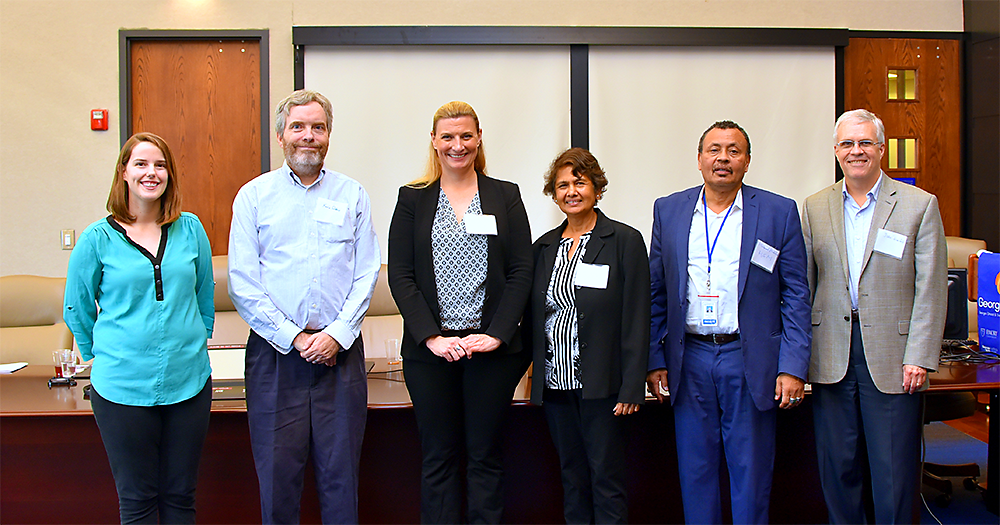2018 Biostatistics, Epidemiology, & Research Design (BERD) Research Forum
Clinical Trial Challenges: Lessons Learned from the NIH Collaboratory Biostatistics & Design Core
Friday, September 28, 2018
11:00 a.m.-3:00 p.m.
Morehouse School of Medicine
Event Details
Overview
The inaugural Biostatistics, Epidemiology, & Research Design (BERD) Research Forum was held at Morehouse School of Medicine on September 28, 2018. Sponsored by Georgia Clinical & Translational Science Alliance’s (Georgia CTSA) BERD program, the Research Forum focused on pragmatic clinical trials with the theme, “Advances & Challenges in Pragmatic Clinical Trials.” The Research Forum brought researchers together from Emory University, University of Georgia, Morehouse School of Medicine, Children’s Healthcare of Atlanta, and regional colleges and small businesses. The BERD Research Forum will be held annually with different methodological foci each year. The Research Forum will rotate annually among the four academic sites of the Georgia CTSA.
Goal
The goal of this Research Forum was to facilitate new collaborations on the methodology or application of pragmatic trials. To help achieve this goal, one keynote address and two case studies were presented, and the Research Forum ended with a fruitful open discussion. A key goal of the BERD program is to provide value-added assistance to markedly improve the quality of the translational and clinical research of Emory University, Morehouse School of Medicine (MSM), Georgia Institute of Technology (Georgia Tech), and University of Georgia (UGA) investigators. This is accomplished by having highly trained, service oriented BERD personnel from Emory’s Rollins School of Public Health, MSM’s Clinical Research Center & Research Center for Clinical & Translational Research, Georgia Tech’s Stewart School of Industrial and Systems Engineering, and UGA’s College of Public Health available to assist early career researchers in a timely manner.

Left to Right: Nancy Murray (Ph.D. candidate with BERD), Kevin Dobbin, Ph.D., Andrea Cook, Ph.D., Amita Manatunga, Ph.D., Mohamed Mubasher, Ph.D., and John Hanfelt, Ph.D. (BERD Director)
Speakers
Keynote
The keynote speaker, Andrea Cook, PhD, is a senior investigator at Kaiser Permanente Washington Health Research Institute and an affiliate associate professor of biostatistics at the University of Washington. Cook is lead biostatistician for the Biostatistics and Study Design Core of the National Institutes of Health (NIH) Collaboratory, which facilitates the implementation of pragmatic clinical trials. She shared her experiences working on pragmatic clinical trials and related resources, such as the Living Textbook.
Case Studies
Amita Manatunga, PhD, professor of biostatistics at Emory University, presented the first case study, which aims to investigate the effectiveness of advanced care planning for end-stage renal disease (ESRD). The patient and family-centered care planning, specifically "Sharing Patient's Illness Representation to Increase Trust" (SPIRIT), intervention study brought to light new statistical considerations for Manatunga to investigate. The SPIRIT study presented was based on ongoing work with Mi-Kyung Song, PhD, professor of nursing at Emory University.
Kevin Dobbin, PhD, associate professor of biostatistics and BERD co-director at the University of Georgia, wrapped up the presentations for the day by focusing on a particular type of pragmatic trial, stepped wedge designs (SWD). He summarized the advantages and disadvantages of SWD and provided statistical advice for those considering to use SWD. Discussion The Research Forum ended with time for participants to ask questions for the experts in the room. This discussion was moderated by Mohamed Mubasher, PhD, professor and senior biostatistician at Morehouse School of Medicine. Some ideas from this discussion included: 1) emphasis that randomized clinical trials are still the gold standard for research, but pragmatic trials can be used to address feasibility; 2) the importance of recording data and regular communication among researchers during the conduct of a pragmatic trial, to maintain study integrity; and 3) encouragement for methodological research in the area of pragmatic clinical trials, despite recent advances, particularly regarding unbiased designs, sample size determination for longitudinal outcomes, and interim analyses.